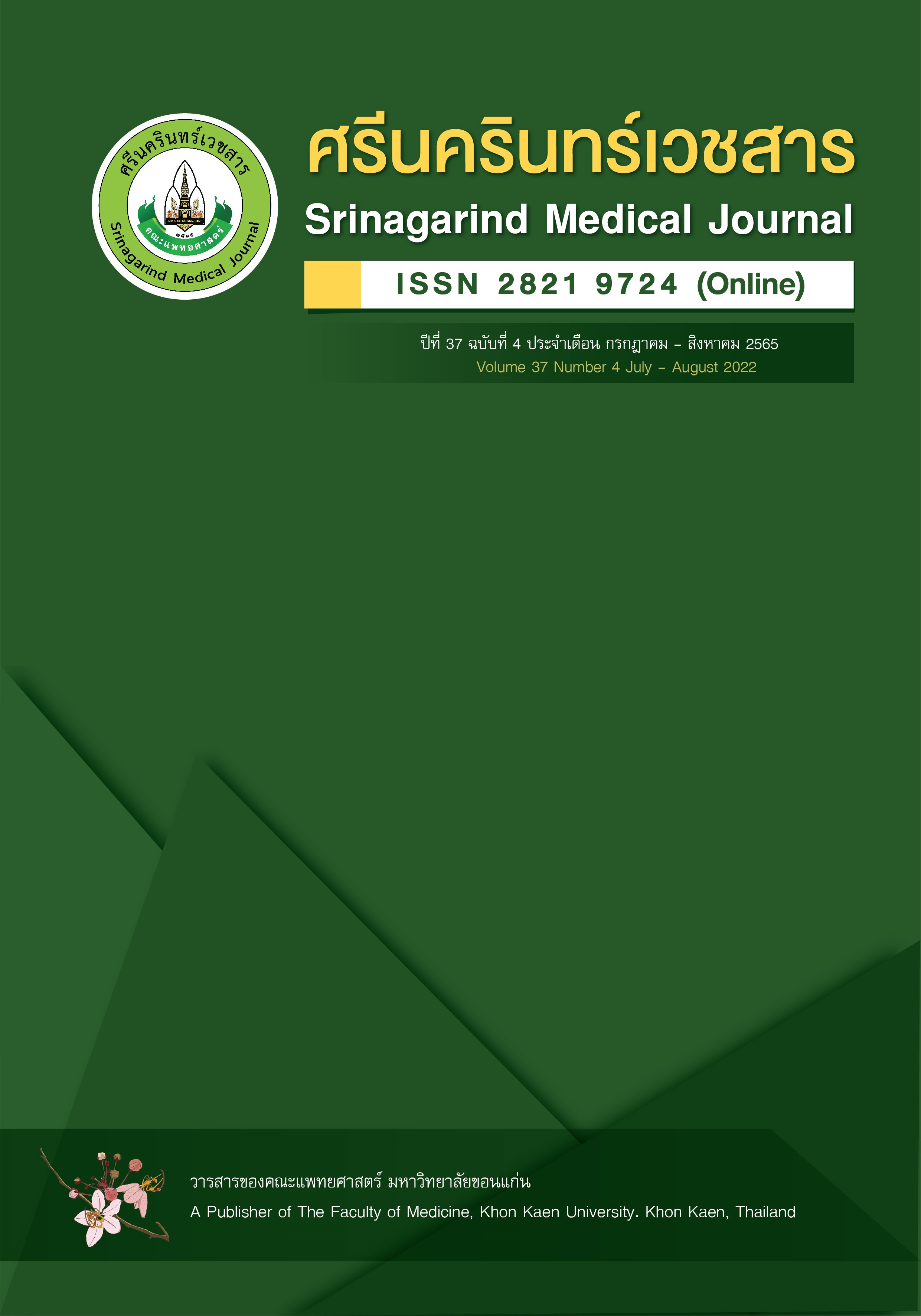Clinical Manifestations and Outcomes of Pediatric Anti-N-methyl-D-aspartate Receptor (NMDAR) Encephalitis in Srinagarind Hospital
Keywords:
Anti-N-methyl-D-aspartate receptor encephalitis, children, clinical manifestation, outcome, relapseAbstract
Background and Objective: Anti-N-methyl-D-aspartate receptor (anti-NMDAR) encephalitis is common and treatable autoimmune encephalitis in children. This study aimed to describe clinical manifestation, investigation, treatment, outcome, and possible factors associated with relapse in pediatric anti-NMDAR encephalitis in Srinagarind Hospital.
Methods: The medical records of 10 children diagnosed with anti-NMDAR encephalitis at Srinagarind Hospital during January 2016-March 2020 were retrospectively reviewed.
Results: The median age of patients was 9.5 years (1-16 years), 90% were female. The most common presentation in pre-puberty was seizure, post-puberty was behavioral symptoms. CSF and serum NMDAR antibodies were identified in all patients. Three patients had evidence of previous viral encephalitis (2 Herpes simplex encephalitis (HSE),1 Varicella zoster encephalitis). Electroencephalography revealed focal epileptiform discharge (60%), extreme delta brush (40%), generalized slow activity (30%). Neuroimaging of previous HSE showed temporal lobe abnormalities (20%), the rest of patients showed non-specific disease finding. Neoplasms were not detected. All received first-line and maintenance immunotherapy. Second-line immunotherapy was given to 4 patients. Six patients (60%) improved after first-line immunotherapy, 2/6 patients developed relapse. Five patients (50%) had complete recovery, Pediatric cerebral performance category (PCPC) score of 1 at last follow-up. The median interval between symptom onset and initiation of immunotherapy was significantly longer in relapse group (78.5 days, IQR 74-83) than non-relapse group (19 days, IQR 13.5-28.5) (p = 0.036).
Conclusions: Seizure was predominated in young children while behavior change typically presented in adolescents. Preceding viral infection may be a trigger and associated with unfavorable outcome. Prolonged interval between symptom onset and first-line immunotherapy was one of possible associated factor of relapse.
References
Dalmau J, Tuzun E, Wu HY, Masjuan J, Rossi JE, Voloschin A, et al. Paraneoplastic anti-N-methyl-D-aspartate receptor encephalitis associated with ovarian teratoma. Ann Neurol 2007;61:25-36.
Armangue T, Titulaer MJ, Málaga I, Bataller L, Gabilondo I, Graus F, et al. Pediatric anti-N-methyl-D-aspartate receptor encephalitis- clinical analysis and novel findings in a series of 20 patients. J Pediatr 2013;162(4):850-6.
Glaser CA, Honarmand S, Anderson LJ, Schnurr DP, Forghani B, Cossen CK, et al. Beyond viruses: clinical profiles and etiologies associated with encephalitis. Clin Infect Dis 2006;43:1565-77.
Peery HE, Day GS, Doja A, Xia C, Fritzler MJ, Foster WG. Anti-NMDA receptor encephalitis in children: the disorder, its diagnosis, and treatment. Handb Clin Neurol 2013;119:1229-33.
Dalmau J, Lancaster E, Martinez-Hernandez E, Rosenfeld MR, Balice-Gordon R. Clinical experience and laboratory investigations in patients with anti-NMDAR encephalitis. Lancet Neurol 2011;10(1):63-74.
Fiser DH, Long N, Roberson PK, Hefley G, Zolten K, Brodie-Fowler M. Relationship of pediatric overall performance category and pediatric cerebral performance category scores at pediatric intensive care unit discharge with outcome measures collected at hospital discharge and 1- and 6-month follow-up assessments. Crit Care Med 2000;28:2616-20.
Zhang M, Li W, Zhou S, Zhou Y, Yang H, Yu L, et al. Clinical features, treatment, and outcomes among Chinese children with anti-methyl-D-aspartate receptor (anti-NMDAR) encephalitis. Front Neurol 2019;10:596.
Hung SKY, Hiew FL, Viswanathan S. Anti-NMDAR encephalitis in association with herpes simplex virus and viral and bacterial zoonoses. Ann Indian Acad Neurol 2019;22(1):102-3.
Chow FC, Glaser CA, Sheriff H, Xia D, Messenger S, Whitley R, et al. Use of clinical and neuroimaging characteristics to distinguish temporal lobe herpes simplex encephalitis from its mimics. Clin Infect Dis 2015;60:1377-83.
Schmitt SE, Pargeon K, Frechette ES, Hirsch LJ, Dalmau J, Friedman D. Extreme delta brush: a unique EEG pattern in adults with anti-NMDA receptor encephalitis. Neurology 2012;79:1094-100.
Titulaer MJ, McCracken L, Gabilondo I, Armangue T, Glaser C, Iizuka T, et al. Treatment and prognostic factors for long-term outcome in patients with anti-NMDA receptor encephalitis: an observational cohort study. Lancet Neurol 2013;12:157-65.
Hacohen Y, Deiva K, Pettingill P, Waters P, Siddiqui Ata, Chretien P, et al. N-methyl-D-aspartate receptor antibodies in post-herpes simplex virus encephalitis neurological relapse. Mov Disord 2014;29(1):90-6.
Grahn A, Studahl M. Varicell-zoster virus infection of the central nervous system-Prognosis, diagnostics and treatment. J Infect 2015;71(3):281-93.
Nosadini M, Granata T, Matricardi S, Freri E, Ragona F, Papetti L, et al. Relapse risk factors in anti-N-methyl-D-aspartate receptor encephalitis. Dev Med Child Neurol 2019;61:1101-7.
Downloads
Published
How to Cite
Issue
Section
License
Copyright (c) 2022 Srinagarind Medical Journal

This work is licensed under a Creative Commons Attribution-NonCommercial-NoDerivatives 4.0 International License.




